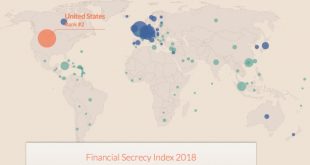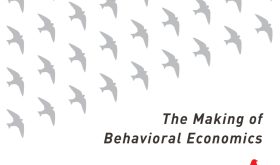from Dean Baker With the Super Bowl now behind us, America eagerly awaits the next big event: the announcement of the winner in Jeff Bezos’ contest to determine which combination of state and local governments is prepared to give him the most money to be home to Amazon’s new headquarters. Narrowed from a field of more than 200 applications, 20 finalists now wait with baited breath for the news, expected sometime later this year. But while the politicians who join Bezos for the photo op...
Read More »We’re #2! – Financial Secrecy Index 2018
from David Ruccio According to the Tax Justice Network, the United States ranks second in the 2018 Financial Secrecy Index. This is based on a secrecy score of 59.8, which is practically unchanged from 2015. The only country ahead of the United States is Switzerland, with a secrecy score of 76. The rise of the United States continues a long-term trend, as the country was one of the few to increase their secrecy score in the 2015 index. The continued rise of the United States in the...
Read More »The limits of probabilistic reasoning
from Lars Syll Probabilistic reasoning in science — especially Bayesianism — reduces questions of rationality to questions of internal consistency (coherence) of beliefs, but, even granted this questionable reductionism, it’s not self-evident that rational agents really have to be probabilistically consistent. There is no strong warrant for believing so. Rather, there is strong evidence for us encountering huge problems if we let probabilistic reasoning become the dominant method for...
Read More »Open thread Feb. 13, 2018
One way to protect democracy is to stop pushing policies that redistribute income upward.
from Dean Baker That one is apparently not on the agenda, at least according to Amanda Taub’s NYT “The Interpreter” piece. The piece notes the declining support for center right and center left parties in most western democracies. While it notes that people feel unrepresented by these parties, it never states the obvious, these parties have consistently supported monetary, fiscal, trade, and intellectual property policies that redistribute an ever-larger share of income to people like...
Read More »The semantics of mathematical equilibrium theory
from Michael Hudson If mathematics is deemed to be the new language of economics, it is a language with a thought structure whose semantics, syntax and vocabulary shape its user’s perceptions. There are many ways in which to think, and many forms in which mathematical ideas may be expressed. Equilibrium theory, for example, may specify the conditions in which an economy’s public and private-sector debts may be paid. But what happens when not all these debts can be paid?...
Read More »New Classical macroeconomists — people having their heads fuddled with nonsense
from Lars Syll McNees documented the radical break between the 1960s and 1970s. The question is: what are the possible responses that economists and economics can make to those events? One possible response is that of Professors Lucas and Sargent. They describe what happened in the 1970s in a very strong way with a polemical vocabulary reminiscent of Spiro Agnew. Let me quote some phrases that I culled from the paper: “wildly incorrect,” “fundamentally flawed,” “wreckage,” “failure,”...
Read More »Let us reconsider the idea of demographic transition.
from Herman Daly By definition this is the transition from a human population maintained by high birth rates equal to high death rates, to one maintained by low birth rates equal to low death rates, and consequently from a population with low average lifetimes to one with high average lifetimes. Statistically such transitions have often been observed as standard of living increases. Many studies have attempted to explain this correlation, and much hope has been invested in it as an...
Read More »The absence of a theory of public economy in today’s economics
from June Sekera More than a century ago, the effective operation of the public economy was a significant, active concern of economists. With the insurgence of market-centrism and rational choice economics, however, government was devalued, its role circumscribed and seen from a perspective of “market failure.” As Backhouse (2005) has shown, the transformation in economic thinking in the latter half of the 20th century led to a “radical shift” in worldview regarding the role of the state....
Read More »The flawed premises of mainstream economic theory
from Lars Syll You know, and I know, that we do not live in a world of Econs. We live in a world of Humans. And since most economists are also human, they also know that they do not live in a world of Econs … Nevertheless, this model of economic behavior based on a population consisting only of Econs has flourished, raising economics to that pinnacle of influence on which it now rests. Critiques over the years have been brushed aside with a gauntlet of poor excuses and implausible...
Read More » Heterodox
Heterodox




